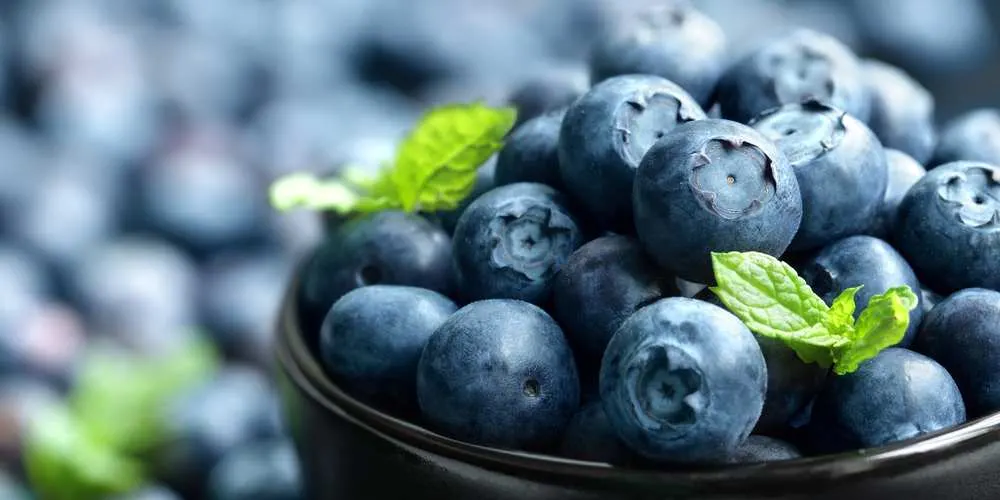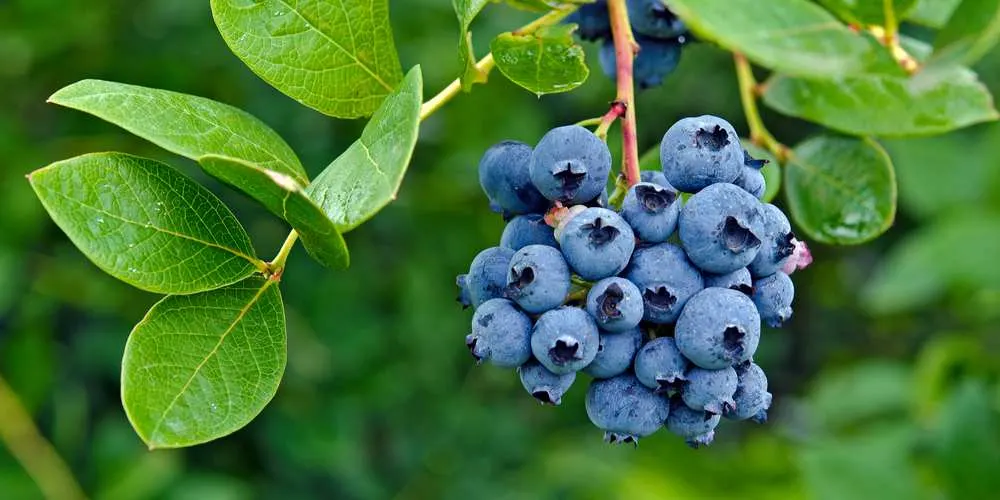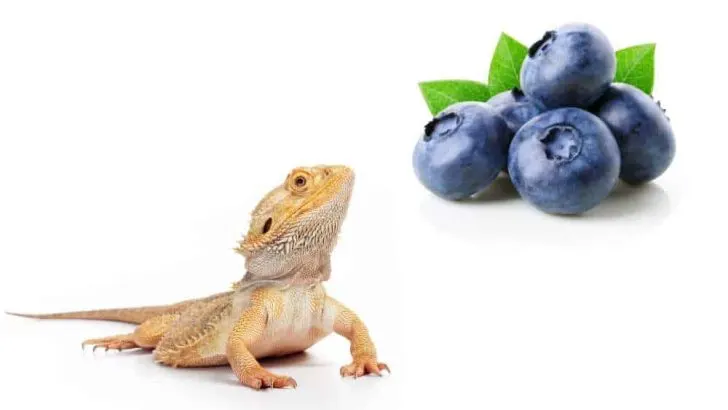It can sometimes be challenging to find a fruit with an optimal amount of nutrients for our pet beardies. Some fruits have high levels of sugar present in them; others don’t have enough potassium.
Most people search berry-type fruits for a solution, and I can’t blame them! On that note, the question “Can bearded dragons eat blueberries?” is asked quite frequently.
Oddly enough, bearded dragons can safely enjoy all berry-type fruits, especially blueberries!
Many people are skeptical of this fruit, as they think that the sugar present in blueberries is too much for beardies to handle. What are the benefits of providing blueberries to bearded dragons? Can they suffer in any way or form from eating this berry? How frequently can beardies eat blueberries?
Facts speak for themselves: beardies can eat blueberries, as long as you offer them some in a moderate amount. Scroll down to find out exactly how much that is!

Health Benefits Of Blueberries
Let’s jump right into the topic and take a look at the macros of blueberries:
| Water | 84 % |
| Calories | 57 |
| Sugar | 9.96 g |
| Fiber | 2.4 g |
| Protein | 0.74 g |
| Fat | 0.33 g |
| Vitamin C | 9.7 mg |
| Vitamin E | 0.57 mg |
| Potassium | 77 mg |
| Phosphorus | 12 mg |
| Calcium | 6 mg |
As you can see, there is a lot of stuff above; many numbers and unfamiliar minerals to some of you. Every single thing above affects, in some way, our dear beardies. I’ll further dissect blueberries’ components, one by one.
Water
Bearded dragons tend to stay on their feet all day long. For them to be able to do so, it’s necessary to provide them with a freshwater source. At any given point, they need to have some kind of a bowl from which they can drink water to rehydrate themselves.
No matter what time of the year it is, bearded dragons will get rather thirsty when they start to roam throughout the vivarium. Sometimes, it gets extremely hot on those scorching summer days – beardies need to hydrate themselves properly on those days so that they never dehydrate.
Offering bearded dragons some blueberries will help them with that, as water makes 84% of a single blueberry.
Calories
Some of you might consider starting to release your bearded dragons outside the vivarium. If you want to do so, you should keep in mind that they will need extra food to sustain them when they start to travel throughout your room.
As beardies have a strict calorie diet, it can be tricky sometimes to think of a new food source to implement in their food regime. Blueberries fit in perfectly here, as they have an optimal amount of calories for beardies – not too little and not too much!
Sugar
Many fruits that you find in your local market have a high amount of sugar inside that can badly affect bearded dragons. Whenever beardies eat food that has more sugar than it should, it raises their blood sugar levels.
Fortunately for them, blueberries are made of less than 10% sugar, making them a good source of healthy sugars. Keep in mind that you should only give bearded dragons one blueberry twice per week. Exceeding that amount might cause their blood sugar levels to rise.
Fiber
Bearded dragons are voracious animals – they will eat everything presented to them rather quickly if needed. It’s a bad habit to allow them to eat fast. Some problems can happen if they do so, like:
- Choking hazard – while eating too fast, bearded dragons can stumble upon a chunk of food larger than what they can adequately crush. They could choke on that chunk in that rush if they didn’t correctly crush it in smaller pieces.
- Eating some foods too fast can lead to some digestive problems. Beardies‘ internal organs can’t digest food properly if they overate in a short time.
If you notice that your bearded dragon is eating too fast, provide them with some blueberries from time to time. Blueberries are an excellent source of fiber that will aid them in digesting various foods easier!
Protein
Bearded dragons’ diet is mainly composed of insects, small animals, vegetables, and fruits. Believe it or not, nearly 75% of their food regime needs to be made of various small animals and insects! Are you following me? Beardies need a diet that has a lot of protein.
Luckily for bearded dragons, if you offer them some blueberries, they will find themselves eating a delightful fruit that even has some proteins inside! Although 0.74g of protein per 100 grams of blueberries doesn’t seem much for us, bearded dragons will gladly partake in them!
Fat
It’s crucial to provide your bearded dragons with food that doesn’t have too much fat in them.
The fat that we see on the body isn’t that dangerous as fats stuck on the internal organs. Fats can slow the organs down to the point where they can’t function properly anymore.
Pay close attention to the amount of food that you give to your bearded dragons. You won’t have to worry about blueberries, as they have a neglectable amount of fats present inside them!
Vitamin C And E
All foods are made of various components, and those, when ingested, release free radicals within the body. As bearded dragons start to digest stuff, radicals in those foods are released and begin to occupy some space in their organs.
It’s a bad thing to leave those radicals to roam freely in their bodies. To prevent that, it’s crucial to provide beardies with vitamin C and E. Fortunately for bearded dragons, blueberries have a sufficient amount of those vitamins, as they will provide their organism with antioxidants.
Antioxidants will hunt and capture those free radicals and destroy them before they start to harm beardies’ little bodies!
Potassium
Do you know what the two most important organs that reside within both humans and bearded dragons are? It’s the brain and the heart, of course! Without those two, our bodies couldn’t exist in the first place!
It’s essential to provide bearded dragons with food that will aid those two organs, especially the heart. The most common way to do so is to give them food that is rich in potassium. Let me propose a phenomenal fruit that has exactly that!
Blueberries will aid the overall health of beardies, as the potassium keeps their heart-healthy, making it stronger by enhancing its contraction power.
Phosphorus And Calcium
Bearded dragons need to consume more calcium than phosphorus in their daily diet. Unfortunately for them, blueberries have an unbalanced 1:2 calcium to phosphorus ratio.
It’s necessary to remember that you should never give them more than one blueberry per week, as giving them more can lead to health-related problems. The most common one is a metabolic bone disease.
Any failure to achieve a healthy ratio between calcium and phosphorus can lead to that. Even without offering them blueberries, beardies are likely to suffer from this disease at least once in their life.
To lower the risk of that happening, try implementing various calcium supplements to ensure that your beardie is getting enough calcium. Visit your local veterinarian to get further instructions on how to provide bearded dragons with those supplements safely.

Introducing Blueberries To Bearded Dragons Properly
Before you offer your pet beardie some berries, it’s necessary to wash them with cold water. Place the blueberries in a strainer and gently stir them while the water is dripping from the faucet. Blueberries aren’t instantly clean when you purchase them from your local market.
Some of them are potentially sprayed with toxins, such as pesticides and insecticides, to prevent insects from targeting them. It’s best to try and find organic blueberries for bearded dragons as they are never sprayed with those toxins.
Various specs of dust and dirt will be present as well on the blueberries – always clean them before you offer them to beardies! They will be thankful whenever they have a chance to eat some fresh blueberries!
Make sure to put away the blueberries in a fridge to maintain them in a fresh state. Never offer old fruits to bearded dragons, as they aren’t capable of adequately digesting rotten food.
Be present whenever you give some blueberries to beardies. You can put the blueberry in a bowl and serve it like that, or let the bearded dragon take the berry directly from your hand. It can get messy when they eat them, so be prepared to clean them afterward!

Can Bearded Dragons Eat Blueberries? – Summarization
If some of you are still skeptical about can bearded dragons eating blueberries, allow me to shatter your concerns! With an optimal amount of nutrients, blueberries are an excellent snack for all beardies, young and old!
Blueberries are a great source of water for bearded dragons. On top of that, they have a low amount of sugar inside them. To remain on the safe side, only offer one fresh blueberry to bearded dragons once or twice per week.
Any more than that can lead to some problems for beardies, like developing metabolic bone disease. Bearded dragons require a sufficient amount of calories, and the phosphorus to calcium ratio isn’t quite perfect in blueberries.
Because of that, it’s necessary to offer them blueberries only on rare occasions. Be considerate and think of bearded dragons’ health first!
Read Also: Can Bearded Dragons Eat Blackberries?

